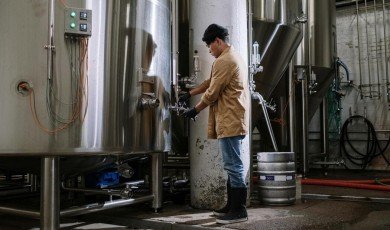Sustainable Brewing: How Eco-Friendly Practices Are Shaping the Future of Beer
Discover how innovative eco-friendly practices are transforming beer factories and the craft beer industry, ensuring a greener, more sustainable future for every brew lover.
Introduction
The beer industry has long been associated with tradition, craftsmanship, and community. But beyond the familiar clink of pint glasses and the aroma of fresh hops, a new revolution is underway—one centered on sustainability. Beer factories and craft breweries worldwide are adopting eco-friendly practices, not just as a trend but as an essential evolution. With climate change, resource scarcity, and a growing demand for ethical consumption, sustainable brewing is shaping the very future of beer. In this post, we’ll delve into how beer makers are reducing their environmental footprint, innovating with green technologies, and crafting exceptional beers that are as good for the planet as they are for our palates.
The Environmental Impact of Traditional Brewing
Brewing beer, while a historic and beloved process, can have a significant impact on the environment. Traditional beer production demands large amounts of water, energy, and agricultural inputs. Every pint typically requires up to seven pints of water, much of which is used in cleaning and cooling systems. The malting, mashing, and fermentation stages consume considerable energy, often sourced from fossil fuels. Packaging generates waste, while spent grains and wastewater can challenge disposal and treatment systems.
Factors like transportation, refrigeration, and the use of pesticides in hop and barley farming further exacerbate beer’s carbon footprint. As awareness grows, many breweries—especially in the craft segment—are acknowledging these issues and pioneering meaningful change. Let’s explore how the industry is embracing sustainability at every stage.
Sustainable Brewing: Innovative Eco-Friendly Practices
Addressing environmental concerns in the brewing journey involves rethinking water use, energy consumption, sourcing, packaging, and waste management. Here’s how leading beer factories and craft breweries are making a real difference:
1. Water Conservation and Management
Water is the lifeblood of beer. Breweries are deploying advanced technologies to minimize waste and recycle water throughout the brewing process. Examples include:
- Installing closed-loop systems that reuse cooling water.
- Treating and filtering wastewater for non-potable brewery applications, like cleaning or irrigation.
- Investing in high-efficiency cleaning equipment to reduce rinsing cycles.
Notable leaders, such as Sierra Nevada and New Belgium Brewing, have implemented on-site water treatment facilities to purify and reuse water, slashing their overall consumption and preserving local resources.
2. Energy Efficiency and Renewable Power
Brewing’s energy-intensive processes offer an opportunity to integrate cleaner power. Breweries are increasingly:
- Adopting solar panels, wind turbines, and biogas systems to produce or supplement electricity.
- Optimizing equipment—like heat exchangers and variable speed drives—to reduce wasted energy.
- Capturing waste heat for use in other brewing steps, improving overall efficiency.
Heineken, for instance, has set ambitious targets to run its breweries on renewable energy. Many craft breweries are likewise turning to local grids powered by wind or hydroelectric sources, conveying a powerful story to eco-conscious consumers.
3. Sourcing Local and Organic Ingredients
Locally sourced and organic ingredients not only enrich beer flavor profiles but also cut down on the environmental costs of transportation and synthetic fertilizers. Breweries are:
- Partnering with local farmers for organic barley and hops grown using regenerative farming methods.
- Experimenting with alternative ingredients, such as heritage grains or wild botanicals requiring fewer resources.
- Creating seasonal and small-batch beers timed with local harvests, further reducing their carbon footprint.
This ‘farm-to-glass’ approach strengthens local economies and aligns breweries with sustainable agriculture initiatives.
4. Reducing Packaging Waste and Innovating Materials
Packaging is a major contributor to brewing’s environmental impact. Forward-thinking beer brands are:
- Using lightweight glass bottles and eco-friendly, recyclable cans.
- Developing biodegradable six-pack rings and carton materials.
- Launching refillable growler programs and encouraging package returns.
Carlsberg’s “Green Fiber Bottle,” made from sustainable wood fibers, is one example of a breakthrough in circular, low-impact beer packaging. Meanwhile, smaller craft breweries are opting for reusable stainless steel kegs and partnering with local bottle-sharing initiatives.
5. Upcycling and Waste Reduction
Spent grains and yeast byproducts are no longer destined for landfill. Breweries are finding creative uses for their waste, such as:
- Supplying local livestock and poultry farms with high-protein spent grain feed.
- Collaborating with bakeries to make bread, dog treats, and even pasta from spent grains.
- Composting organic waste or using it to generate biogas for brewery operations.
These cycles not only reduce landfill burden but enrich local food chains and communities.
6. Sustainable Distribution and Community Engagement
The final leg of sustainability involves distribution and education. Breweries are:
- Optimizing delivery routes and using low-emission vehicles to shrink logistics’ carbon footprint.
- Launching brewery taprooms and onsite sales to cut transportation entirely, fostering local beer culture.
- Educating employees and customers about sustainability through tours, events, and collaborations.
By engaging both staff and patrons, breweries inspire a community-wide commitment to environmental stewardship—extending the impact of their green initiatives far beyond the factory walls.
The Business Case for Sustainable Brewing
Embracing sustainable practices isn’t just good for the Earth—it’s good for business. Today’s consumers, especially the sought-after millennial and Gen Z demographics, are increasingly willing to pay a premium for eco-friendly products. Environmentally responsible breweries earn goodwill, media attention, and brand loyalty, setting themselves apart in a competitive market.
Many jurisdictions also offer grants, tax breaks, and incentives for green upgrades. Over time, reducing resource consumption and waste leads to significant cost savings—allowing even small craft breweries to reinvest in innovation or growth. Transparency and eco-certifications, such as the Brewers Association's "Sustainability Benchmarking Program", reinforce credibility and open doors to environmentally focused retailers and partners.
Conclusion: Raising a Glass to a Greener Future
The future of beer is undeniably green. From energy-efficient beer factories to community-minded craft breweries, sustainability is no longer a niche value but the foundation for growth and resilience in the industry. Eco-friendly brewing practices are not only helping to mitigate environmental harm, but they are fostering stronger connections between beer makers, farmers, and drinkers everywhere.
Whether it’s by sipping a local organic IPA, supporting breweries with ambitious sustainability goals, or spreading the word about green brewing innovations, each of us can play a role in this movement. So, next time you lift your pint, toast to the brewers shaping a more sustainable, delicious, and responsible tomorrow—one beer at a time.
Are you a brewery interested in sustainable practices? Or a beer lover passionate about eco-friendly choices? Share your thoughts below and join the conversation on how sustainable brewing is changing the world, one glass at a time.








